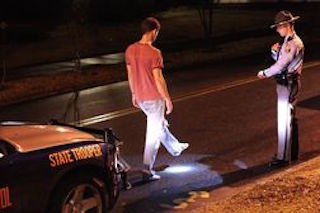Field sobriety tests (FST) include the HGN (eye test), the Walk and Turn Test, and the One-Leg Stand Test. Another common FST is the portable breath test. Many officers will tell the person being investigated for DUI that the portable breath test is "just to tell me a positive or negative for alcohol." This is complete misstatement of what is actually happening. Most, if not every single portable breath test, give a numerical blood alcohol amount which the officer views to see what your result is. This amount shown on the portable breath test is not admissible against you as a blood alcohol level at trial but the officer is going to look immediately at what the portable breath test result is. These portable breath tests or PBT's can be inaccurate and are not approved by the GBI Division of Forensic Sciences. That is why this result is not admissible against you at trial.
In the Ammons case, the Defendant refused to perform the common field sobriety tests that an officer requested her to perform after being stopped and investigated for a DUI. In this case the prosecutors were trying to introduce evidence to the jury that the Defendant refused these roadside tests. In actuality, there are many reasons why people refuse these roadside tests (other than-what the prosecutors are trying to show-in that-they would have taken the tests but they thought they would fail them). The tests have a lot of directions that most people have never heard before. They may be older or have injuries that may prevent them from performing physical dexterity tests. They have never performed these tests before. And, now in performing the One-Leg Stand Test, they are being asked to stand on one foot with their hands down by their sides, with a police officer shining a flashlight at them, and count to 30-1 thousand (30 seconds) all while standing on one foot. The "clues" on this test are: putting your foot down, swaying, hopping, or raising your arms. I would argue that most people would exhibit clues on the field sobriety tests if I was administering these tests in the comfort of an office when they were not being investigated for a crime. The Georgia Supreme court held in the Ammons case that Article I, Section I, Paragraph XVI of the Georgia Constitution ("Paragraph XVI") provides that "[n]o person shall be compelled to give testimony tending in any manner to be self-incriminating." This protection against self-incrimination applies to preliminary breath tests using an alco-sensor and field sobriety tests that require the cooperation of the suspect. WHAT THIS MEAN is that: The Defendant (or a person being investigated for a DUI) has the right to refuse to perform the preliminary breath test and the field sobriety tests under the Georgia Constitution, and most importantly that the evidence of his/her refusals cannot be introduced as evidence of guilt against him/her at trial. This is an important protection that Georgia citizens are given under our Georgia Constitution.
0 Comments
|
AuthorBlog posts by Bill Hardman at Georgia DUI and Criminal Law Archives
April 2024
Categories |
- Home
- Do I need a 30-Day Letter in my DUI Case?
-
Location of your case
- Enter the location of your case
- Athens DUI Lawyer
- Atlanta DUI Lawyer
- Banks County DUI Lawyer
- Baldwin, GA DUI Lawyer
- Barrow County DUI Lawyer
- Blue Ridge DUI Lawyer
- Buford DUI Lawyer
- Clayton County DUI Lawyer
- Clayton Georgia DUI Lawyer
- Cobb County DUI Lawyer
- Cumming DUI Lawyer
- Dahlonega DUI Lawyer
- Dekalb County DUI Lawyer
- Flowery Branch DUI Lawyer
- Fulton County DUI Lawyer
- Duluth DUI Lawyer
- Fannin County DUI Lawyer
- Gainesville DUI Lawyer
- Gwinnett County DUI Lawyer
- Hall County DUI Lawyer
- Lawrenceville DUI Lawyer
- Lumpkin County DUI Lawyer
- Newnan DUI Lawyer
- Oakwood DUI Lawyer
- Smyrna DUI Lawyer
- Rabun County DUI Lawyer
- Roswell DUI Lawyer
- Statham DUI Lawyer
- Suwannee DUI Lawyer
- White County DUI Lawyer
- Winder DUI Lawyer
- Georgia DUI and Criminal Law Updates
- Contact
- DUI Cases In Georgia
- Ask Us About Your Case
- Traffic tickets
- Is my Georgia Driver's License suspended now?
- Drug Possession in Georgia
- Car Wreck/Personal Injury
- City or County of DUI arrest
- About
- Hall County BUI Lawyer
- Important Georgia DUI Laws
William S. Hardman, Jr., P.C.
417 Green Street
P. O. Box 438
Gainesville, GA 30503
Phone 770-530-1164
Email: [email protected]
No information contained on this website is to be construed as legal advice in your case. Please consult with a licensed Georgia attorney before making any legal decisions in your case.
417 Green Street
P. O. Box 438
Gainesville, GA 30503
Phone 770-530-1164
Email: [email protected]
No information contained on this website is to be construed as legal advice in your case. Please consult with a licensed Georgia attorney before making any legal decisions in your case.
©2022 William S Hardman Jr. Attorney at Law | All Rights Reserved

 RSS Feed
RSS Feed
